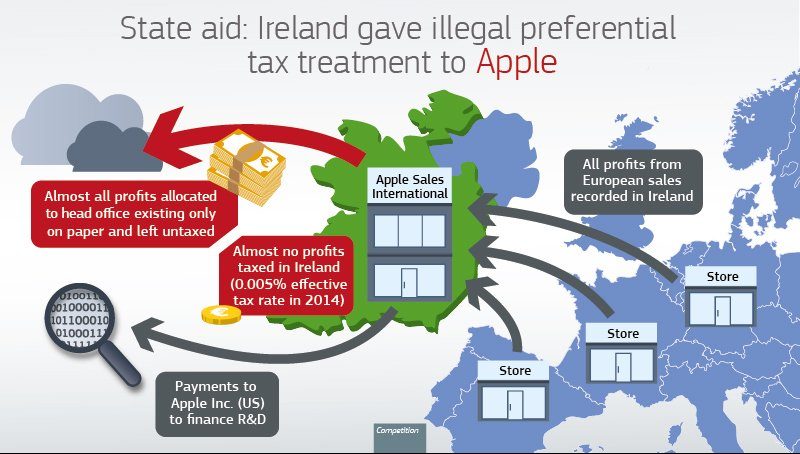The European Commission has finally ruled in its investigation into the tax affairs of computing giant Apple, and says that Ireland has to recoup up to €13 billion in back taxes from the US firm.
The commission found that deals made in 1991 and 2007 between Apple and Irish tax officials amounted to state aid which is illegal under EU rules. The official press release can be found here.
“Member States cannot give tax benefits to selected companies,” Commissioner Margethe Vestager says in that statement.
“This is illegal under EU state aid rules. The Commission’s investigation concluded that Ireland granted illegal tax benefits to Apple, which enabled it to pay substantially less tax than other businesses over many years,”Vestager said.
“In fact, this selective treatment allowed Apple to pay an effective corporate tax rate of 1 per cent on its European profits in 2003 down to 0.005 per cent in 2014.”
How companies reduce tax in the EU
Apple, along with many other technology companies, has long been the target of tax activists within Europe for exploiting loopholes in the European Union’s free trade laws that allow companies to trade over borders. Countries like Ireland and Luxemburg have offered multinationals low rates of corporate tax to encourage them to set up offices there. Once established in one country, all sales throughout the EU zone are then billed to the low tax region regardless of the place the transaction actually took place.
Free movement of goods, services and people are a fundamental part of the EU philosophy. For this reason, it seems, the EC judgement makes it clear that today’s decision “does not call into question Ireland’s general tax system or its corporate tax rate.”
However, the EC did find that specific arrangements made with Apple allowing it to move cash between subsidiaries based in Ireland amounted to a tax dodge not open to other companies, which is against EU rules. This selective treatment granted to Apple allowed it to pay a corporate tax rate of just 1 percent of all of its European profits.
“The tax treatment in Ireland enabled Apple to avoid taxation on almost all profits generated by sales of Apple products in the entire EU Single Market,” Vestager said. “This is due to Apple’s decision to record all sales in Ireland rather than in the countries where the products were sold.”
Similar judgements were made against The Netherlands and Luxembourg last year regarding Starbucks and Fiat.
The Irish government is now expected to recover €13 billion in back taxes, including interest from Apple for the period 2003 to 2014. According to the judgement, Apple changed its set-up in Ireland in 2014. The tax arrangements date back to 1991 but the EC can only rule historically over a ten year period.
The EC points out that this is not a fine or an official censure of Apple, rather an attempt to restore fairness in the market.
The EU finding may have extreme relevancy here in South Africa as all of the big internet companies – Google, Apple, Facebook, Uber, AirBnB – currently channel revenues made in South Africa through their European subsidiaries to avoid paying local tax.
Apple has responded to the judgement with this short statement.
The European Commission has launched an effort to rewrite Apple’s history in Europe, ignore Ireland’s tax laws and upend the international tax system in the process. The Commission’s case is not about how much Apple pays in taxes, it’s about which government collects the money. It will have a profound and harmful effect on investment and job creation in Europe.
Apple follows the law and pays all of the taxes we owe wherever we operate. We will appeal and we are confident the decision will be overturned.
According to the EC’s statement on the judgement, the Irish government has the right to appeal but must recover the money pending the findings of the appeal court.
Apple’s local representatives were unable to offer comment at this time.
This article was updated following publication with extra detail and background.

